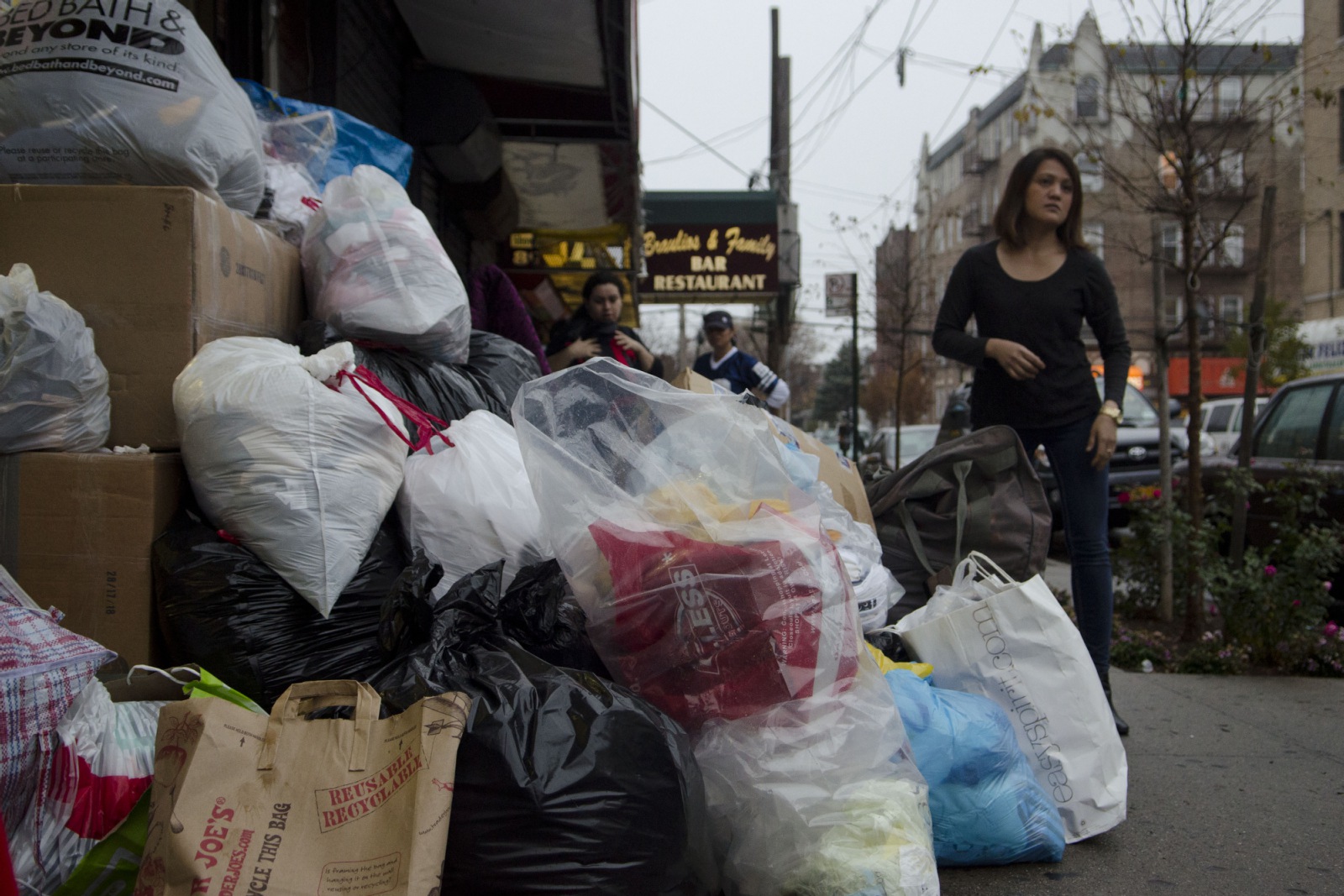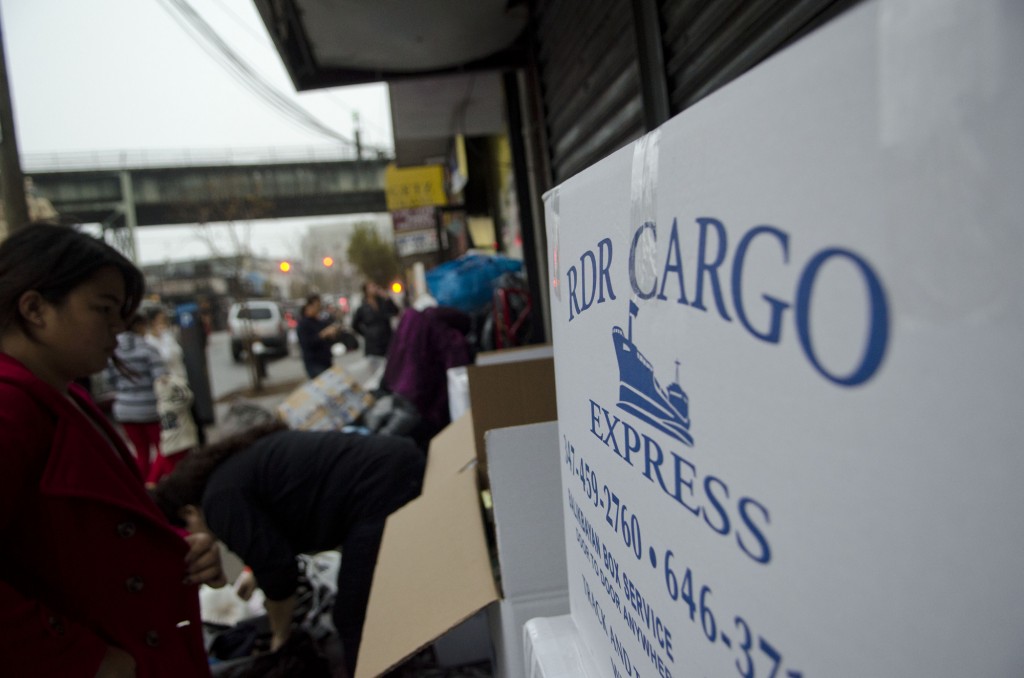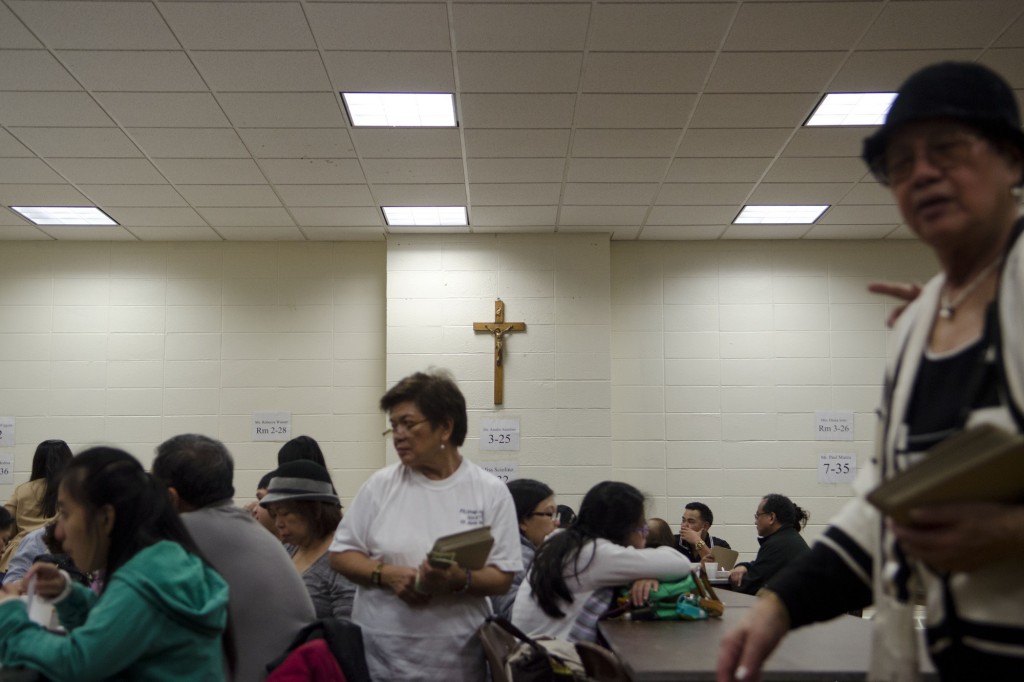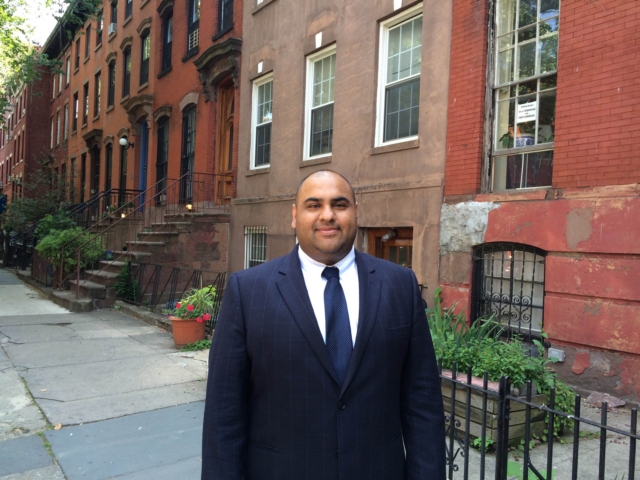…incoming donations were piled up two and three boxes deep on the sidewalk.

November 18, 2013
A group of friends and associates of the Filthy Rich Barbershop in Woodside, Queens were meeting to discuss what they could do to help with the relief effort in the Philippines. They settled on the idea of raising money through individual donations and fundraising events, setting a goal of $10,000 to help victims of Typhoon Haiyan (also called Typhoon Yolanda). But there was a hitch: how could they be sure the money would go to the right place?
As the Filipino community in New York City mobilizes to help with the relief effort following the destruction of Typhoon Haiyan, many people are struggling to identify the most effective way to send donations. Extensive damage to roads and infrastructure makes it impossible to make personal shipments to family or friends in the most affected areas, and making contact with organizations on the ground is difficult for most do-gooders who are halfway around the world. On top of the logistical difficulties, members of the diaspora community maintain caution in making donations: many are wary to trust government agencies, which they perceive as unreliable at best and blatantly corrupt at worst. People want to be sure their donations will actually go where they’re needed.
At Filthy Rich Barbershop, this charity is taking the form of clothing, canned goods, blankets and other necessities, that will be shipped through a local cargo company and go to ABS-CBN in the Philippines, a widely trusted public service organization. Cassandra Mendoza, whose family owns the barbershop, said that they chose to collect donated items when they heard about a local cargo company that would ship donations for free. Mendoza and her family didn’t trust the government to use donated money properly. “From what I was told, they’re just using the money to pay debt,” said Mendoza. “It’s not directly going to the people.”
“As soon as we saw the news that there were 10,000 people possibly dying and displaced in the Philippines, right away we said, ‘What can we do?’”
Just down the street from Filthy Rich Barbershop is the main New York office of RDR Cargo Express, the company that will be shipping the donations. Since announcing their plan, the business has been inundated with donations. As of Sunday afternoon, incoming donations were piled up two and three boxes deep on the sidewalk. Volunteers sorted and labeled boxes for shipping inside, whittling away at a pile of boxes that reached nearly to the ceiling.
“As soon as we saw the news that there were 10,000 people possibly dying and displaced in the Philippines, right away we said, ‘What can we do?’” said Lourdes Yusal, who co-owns the business with her partner, Rommel Del Rosario. They decided to pay the shipping cost of one 20-foot cargo container dedicated to donations. The Filipino consulate agreed to help get the customs fee waived. “At first we did not really expect that we would have this much. I thought that we would have only 10 boxes,” said Yusal. She estimated that they’ve already received around 200 boxes, half the capacity of the cargo container.

RDR Cargo Express is one of about 30 charitable organizations that the have been approved by the Filipino Consulate General of New York, the primary representative of the Philippines in the northeast. Organizations were approved based on their status as 501-c3 organizations (which are able to issue receipts for tax deductions), their capacity to directly distribute donations once they arrive in the Philippines and for having low overhead costs. “If they send donations to the DSW, for example, it will go through the bureaucracy of acquiring permits and all that,” said Vice Consul Khrys Corpuz, referring to the the Department of Social Works and Development, one of the main government agencies concerned with the relief effort. “It’s just better for people to have options, and being able to choose people who can deliver the relief better and to precise recipients.” As of Tuesday, Nov. 19, Corpuz estimates that as much as $4 million has been donated from the 10-state region that the New York consulate represents, about half coming from Filipino community organizations (the other half coming from large, corporate donors). By Corpuz’s account, that amount could double or triple by mid-December.
“People want to help, but they need an assurance that the needy ones will actually get it”
On the whole, members of New York’s Filipino community have expressed far more willingness to donate to organizations that they already trust. At Saint Joan of Arc Parish in Jackson Heights, attendees to the monthly Filipino mass came bearing shippable goods and cash donations at the behest of the Filipino American Association of the church. The plan was to ship these donations through RDR Cargo Express, whom they chose because of the agencies on the receiving end of the goods in the Philippines. “People want to help, but they need an assurance that the needy ones will actually get it,” said Ramil Buenaventura, one of the organizers of the donation. An assurance that many parishioners wouldn’t feel if they were donating to the government.

“The goods that we donate must go to the people that are really affected, not the government,” said Bong Leuterio, who attended the meeting after the mass. The church relief effort is the first time that she had donated towards the typhoon victims.
Cassandra Mendoza sees a similar situation with the community in Woodside that has been dropping off donations at Filthy Rich Barbershop. “A lot of the urban community that we’re affiliated with, they definitely know what we’re trying to do, which is good,” she said. She still plans to start organizing fundraising events for the relief effort, but she’s going to wait until after the donations of dry goods. Right now it’s easier to buy the box from RDR Cargo Express and know that the clothes and food are going to the right place. “It’s really not like a crazy effort we’re putting into it, having people come by, drop stuff off. Five dollars is nothing to buy a box that’s worth a lot,” she said. “I guess that way we’re doing our part.”

